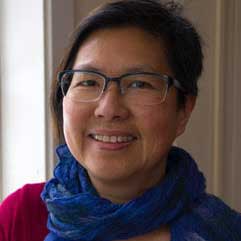Photo: JuPong Lin (right) with Jessica Gordon-Nembhard at the Up and Coming Conference
This year was my first encounter with Up & Coming Food Co-op Conference, a vital learning and networking experience for start-up coops—or “Stage 2-be”, in Up & Coming lingo. It was also the first year organizers (Indiana Cooperative Development Center and its partner Food Co-op Initiative) convened a special track called “Co-ops and People of Color.” Participants in one of the first POC-only sessions led by Jade Barker of CDS noticed the presence of many more POC than in the past. “Jade’s workshop was why I came this year,” said one cooperator sitting next to me.
The POC sessions most importantly gave us a chance to meet and connect with each other and speak openly about the particular struggle of building coops that are truly welcoming to all, within a competitive, white-dominated market. Jade created a safe circle where we could listen to each other and bear witness to the emotional labor of managing the unacknowledged privilege of white cooperators, the white fragility and micro-aggressions we face every day; and strategize in undoing racism within the coop movement.
The story of the Friendship store of the Seward Coop in Minneapolis offers many lessons in building a coop grocery store that truly serves its community. Raynardo Williams, Manager of the Friendship store, celebrated their victories. When their doors opened in 2015, 63% staff were POC, 50% lived within a mile and ½ of store, and employee turnover was very minimal. In their first year, the store exceeded the projected sales budget by $5 million. Susan Pagini’s article in Civil Eats reflects on the remarkable victories as well as the challenges in building this community-based enterprise. “Things haven’t always been so harmonious between the community and the cooperative grocery store,” she wrote. On the path to the Friendship store’s opening, the community fought many battles in an attempt to forge a Community Benefits Agreement. Ray’s workshop focused on the excellent outreach strategies, community conversations, organizational partnerships, recruitment and hiring, and engagement in intercultural competency organizational development (Intercultural Development Inventory). Their recruitment strategy included support of formerly incarcerated folks, holding a job fair near the store where first-time job seekers could receive coaching and do interviews in a group. Management looked for transferrable skills rather than limiting hiring choices to direct experience. Ray also shared invaluable ideas for creating a Culture of the Co-op that affirms the ethnic diversity of the community, such as playing culturally diverse music, making sure to stock white grits and other staple foods from diverse cultures.
While the POC-only sessions gave us an opportunity to meet and support each other, the down-side was that the conversation about race often didn’t transfer into other tracks. Sessions on governance and operations avoided the issue altogether. Darnell Adams and Jessica Gordon-Nembhard offered a session called “Co-op Principles” that puts cooperation and racism in historical context. Gordon-Nemhard highlighted the history she researched in Collective Courage: A History of African American Cooperative Economic Thought and Practice. “The principles of cooperation have been powerful tools for economic independence and solidarity in African American communities since the slave trade began in the colonies…How do we talk in our communities about cooperation in a way that is wholly ours and sparks involvement and participation in growing new cooperatives?” Her question points to the ways that dominant histories of cooperation contribute to the erasure of people of color. If we don’t tell the real history of cooperation as a form of resistance, and trace it to the marginalized communities in which cooperative strategies originated, we risk perpetuating appropriation and gentrification.
Thanks to the organizers of Up & Coming for opening up the dialogue. Next year let’s expand the conversation to every track, every workshop, every cooperator.
By
JuPong Lin

